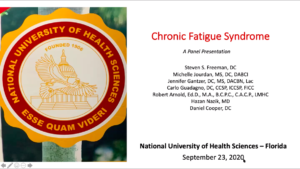 For the first time last month, NUHS-Florida hosted a panel presentation virtually via Zoom, allowing Illinois faculty, staff, and students to join in on a unique learning opportunity.
For the first time last month, NUHS-Florida hosted a panel presentation virtually via Zoom, allowing Illinois faculty, staff, and students to join in on a unique learning opportunity.
Organized by NUHS-Florida faculty every trimester, the panel presentations showcase how a multi-disciplinary panel manages various conditions using a collaborative approach to care. Since its start five years ago, the panels typically include experts such faculty members in both clinical and basic sciences along with alumni, local physicians and community business leaders.
“Our goal is to show students how a solid foundation is critical to making a good differential diagnosis, rendering appropriate treatment and ultimately ensuring good outcomes,” said Steven Freeman, DC, NUHS-Florida Chair of Clinical Sciences, who serves as panel moderator.
The latest panel included NUHS Florida faculty members Michelle Jourdan, DC, DABCI, Jennifer Gantzer, DC, MS, DACBN, Hasan Nazik, MD, Dan Cooper, DC, Carlo Guadagno, DC, CCSP, and Bob Arnold, Ed.D. The panel discussed chronic fatigue syndrome (CFS), a complex and common condition that often goes untreated in patients.
Each expert focused on different aspects of diagnosing and treating the condition through various methods. Dr. Jourdan started off the discussion with how to properly examine patients in person or via telemedicine by either doing a full in-person physical examination or looking at a patient’s skin, tongue and eyes on-screen.
Since the condition can be caused by variety of conditions, Dr. Gantzer discussed the importance of performing a series of blood work and tests. “CFS is not a diagnosis,” said Dr. Gantzer, who teaches clinical diagnostic labs. “It is a screening signal that something is wrong.”
Daniel Cooper, an NUHS instructor who is also the owner of RAD|life clinic, talked about treating the condition through dietary and lifestyle changes like avoiding grains and increasing the patient’s intake of leafy greens, which can help balance gut flora issues, a common symptom of CFS.
Dr. Arnold, a counselor, discussed the psychological side of the condition. He said most CFS patients experience anxiety and depression due to how the condition affects their quality of life. He recommended working on a patient’s stress management and educating the patient’s friends, family and employers about the condition.
“Nothing magical happens in the office,” he said. “It happens when [the patient] leaves.”
At the end of the panel, Dr. Freeman stressed the importance of multiple types of care and treatments, especially for complex conditions like chronic fatigue.
“No one walks around with command of every single mode of treatment for these complex injuries. It’s OK to not know,” he said. “Have command of the things that you need and get help when you need it. That is the way that you approach multi-discipline care and get the best possible outcomes.”
At NUHS, students learn to diagnose and manage a full range of patient conditions while also being taught how to refer and co-manage patient cases with physicians in other medical specialties. National University’s focus on integrative medicine enables its graduates to establish strong referral networks with other physicians, gain respect in the medical community, and most importantly, provide better advice and care for their patients. To learn more about the rigorous training that students receive in the NUHS Doctor of Chiropractic Program visit our blog.




0 Comments